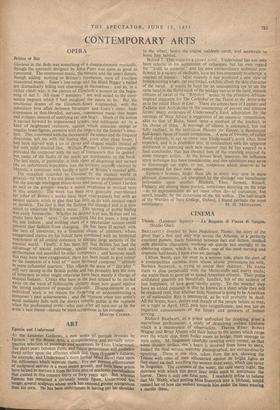CONTEMPORARY ARTS
OPERA
Britten at Bay
Gloriana in the flesh was something of a disappointment musically, though the spectacle designed by John Piper was quite as good as rumoured. The ceremonial music, the masque and the court dances, though adding nothing to Britten's reputation, were all excellent occasional music. Essex's lute-songs and the Blind Beggar's ballad are dramatically telling and charming in themselves ; and so, in a rather chichi way, is the chorus of Elizabeth's women at the begin- ning of Act 3. All these " numbers " are well suited to the coro- nation pageant which I had imagined the opera to be. But the emotional drama of the Elizabeth-Essex relationship, with the subsidiary love affair between Mountjoy and Essex's sister, finds expression in thin-blooded, nervous, ungenerous music that teases and irritates, instead of satisfying ear and heart. Much of the action is carried forward by impassioned tirades, and soliloquies set to a kind of heightened recitative, against which pizzicato strings or angular brass figures, compete with the singers for the listener's atten- tion. This, combined with the shortness of the scenes and the frequent diversions, left me with the feeling that, even after three hours, I had been starved with a lot of clever and elegant snacks instead of fed with solid musical fare. William Plomer's libretto presumably provided the composer with the sort of framework that he desired ; but many of the faults of the music are attributable to the book. The last scene, in particular, is little short of disastrous and seemed like an unforttinate-expedition into the territory rem* claimed by Menotti, a composer with hardly a tenth of Britten's musical gifts. The reception accorded to Gloriana by the musical world in general—by which I do not mean composers or professional critics, but the average intelligent music-lover and patron of Covent Garden as well as the gossips—marks a miner revolution in musical taste in this country. The work has been very generally over-blamed (as other of Britten's works have been over-praised) but with an almost sadistic relish or glee that has little to do with musical merit or demerit. The fact is that the fashion has changed and it is now smart to underrate Britten's music. This veering of public feeling was easily foreseeable. Whether he desired it or not, Britten and his music have been " news " for something like ten years, a long run for any fashion ; and nothing short of a spectacular success could prevent that fashion from changing. He has been ill served, with the best of intentions, by a fanatical clique of adtnirers, whose exaggerated claims on his behalf have combined with an hysterical resentment of all critical comment to alienate large sections of the musical world. Finally, it has been felt that Britten has had the advantage of special patronage, special conditions of work and performance not accorded to, other composers ; and however much this may have been exaggerated, there has been much to give colour to the suspicion of a kind of " most favoured composer " attitude in some influential quarters. This offends the sense of " fair play " still very strong in the British public and has probably lent the note of bitterness to what might otherwise have been merely a change of musical fashion. Critics Who have in the past refused to be carried away on the wave of fashionable idolatry must now guard against the strong undertow of popular disfavour. Disappointment in an individual work is no reason for forgetting or underestimating a, composer's past achievements ; and the moment when any artist's stock suddenly falls with the always volatile public is the moment when the professional critic—who may after all turn out to be the artist's best friend—should be most scrupulous in his estimate.
MARTIN COOPER.


















































 Previous page
Previous page